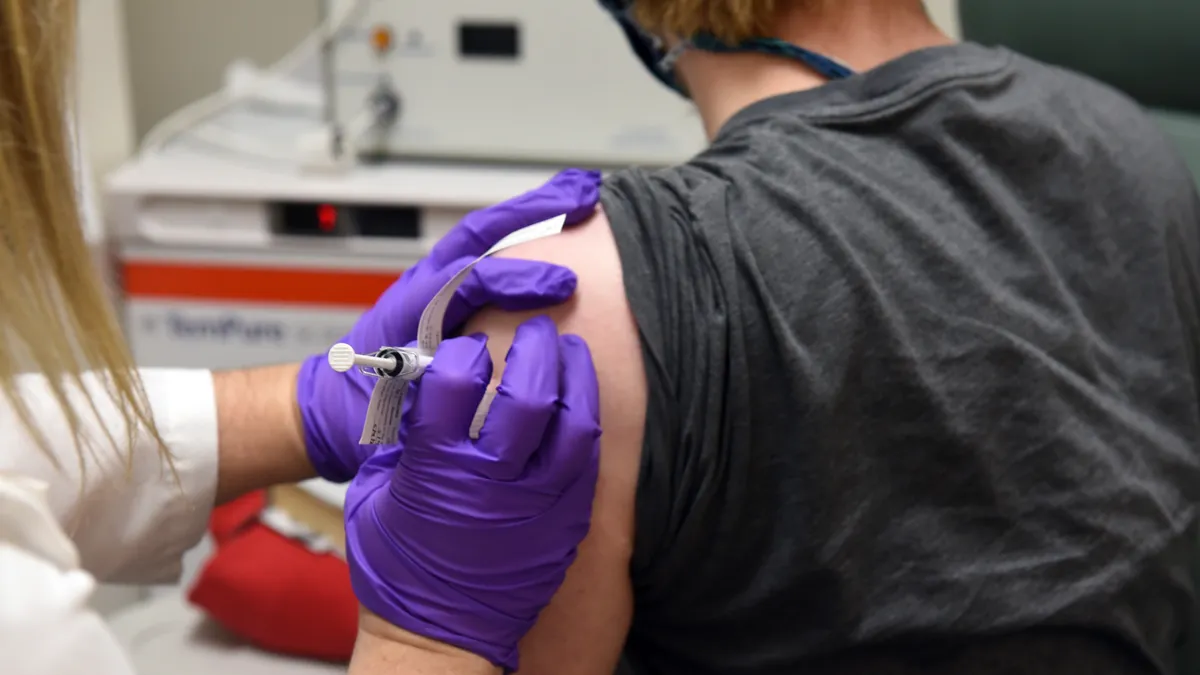Dive Brief:
- Pfizer vaccine doses had to be diverted from delivery after temperature sensors on the packaging showed the container was colder than it should have been, Operation Warp Speed Chief Operating Officer Gen. Gustave Perna said in a press conference Wednesday.
- "We had two trays of Pfizer vaccines that arrived in California in two separate places and as we were tracking the temperature we actually noticed that the temperature got colder than minus 80 — went to minus 92," Perna said. "We locked those trays down. Pfizer and OWS, working with UPS, they never left the truck and we returned them immediately back to Pfizer, and we sent immediate shipments to replace those two trays." Another location in Alabama experienced the same temperature diversion with two trays, which are being replaced.
- The Food and Drug Administration and the Centers for Disease Control and Prevention are working with Pfizer to determine if the vaccines are safe after reaching that temperature. The returned doses number about 3,000, a Pfizer spokesperson said.
Dive Insight:
The dry ice shipments for Pfizer's vaccine are meant to maintain a temperature of minus 70 degrees Celsius.
"As you can imagine, the risk of a dry ice shipment ... going too low due to outside factors is effectively impossible," Volker Kirchner, director of Temperature Control Solutions at World Courier, said in an email.
Shipments becoming too cool is more common for 2 degrees Celsius to 8 degrees Celsius cold storage shipments, Kirchner said, noting that this is the range "where temperature control really turns into an art and a science."
The news of the temperature diversions came Wednesday after successful distribution and inoculation had taken place in locations across the country. Thursday, Pfizer was expected to have its vaccine delivered to 886 more locations, according to Perna.
"It's a constant flow of vaccine always expanding the distribution network in every state that we're really going for," he said.
But some states say the flow is not as constant as expected. Florida Gov. Ron DeSantis said a "production issue" could result in the state getting fewer than the 452,000 doses it expected. Pfizer denied any production issues.
"Pfizer is not having any production issues with our COVID-19 vaccine, and no shipments containing the vaccine are on hold or delayed," Pfizer said in a statement on its website. "This week, we successfully shipped all 2.9 million doses that we were asked to ship by the U.S. Government to the locations specified by them. We have millions more doses sitting in our warehouse but, as of now, we have not received any shipment instructions for additional doses."
The Department of Health and Human Services also said allocation numbers have not changed, and OWS is on track to allocate enough for 20 million U.S. residents to receive the vaccine by the end of December, as long as Moderna receives FDA authorization.
HHS Secretary Alex M. Azar said Wednesday the agency is working with Pfizer to procure more doses, but said, "The core issue ... is Pfizer's ability to manufacture by a date certain. And we are working with them to provide them whatever assistance, now that they have identified some of the production challenges that they've got."
Azar also noted that OWS has less visibility into Pfizer's manufacturing process and capacity than other vaccine manufacturers involved with the federal government operation.
OWS' ability to track the temperature of the vaccine and intervene if a diversion occurs is provided by a technology platform called Tiberius designed specifically for the COVID-19 vaccine rollout. It brings in data from manufacturers, logistics partners, states, Census, and supply information on kitting and syringes.
UPS President of Global Healthcare Wes Wheeler said last week that UPS would send multiple data streams from its trucks to OWS to track the shipments. This includes information from a label on the shipment with radio beacons transmitting the location, a GPS tracker in the trucks that provides temperature and light exposure data, and data from Pfizer's package.
"All that data streams into our command center, and we transmit that data to Operation Warp Speed," Wheeler said. "So, we were all watching the packages all day long."
A Pfizer spokesperson noted that the company has strict quality control measures in place for the vaccine. The ability to monitor real-time location and temperature tracking 24/7 allows it to step in when the company sees a shipment has fallen outside of the desired temperature range.
"Pfizer was able to demonstrate the effectiveness of this world class capability on Tuesday, December 15, when our tracking system alerted our control tower that three shipments were recording colder temperatures outside our internal specifications during transit," the Pfizer spokesperson said. "Our control tower immediately worked to have those three [shipments] returned while in transit and Pfizer in parallel shipped replacement shipments that arrived either the same day or early the next morning."
This story was updated with additional details from HHS.














